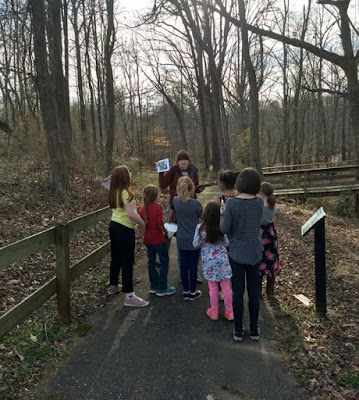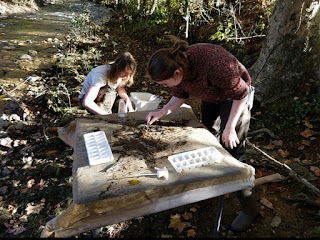Monique, who is also a Board Member with the Watauga Humane Society, an avid hiker, and gardener says the certification program gave her the tools to teach more informed camps as a volunteer with the Humane Society. She also enjoyed meeting other environmental educators and making new friends.
For Monique’s community partnership project, she rebuilt and enhanced the Watauga Humane Society Walking Trails. The Humane Society sits on a 13-acre tract of land in southern Watauga County which includes several acres of walking trails behind the main shelter building which are open to the public and until the initiation of this project were poorly maintained and marked. The walking trails wind through a stand of established woods with native tree species including maples, oaks, black gum, Frazier fur, white pine, and Frazier magnolia. The walking trails are rich with understory species such as rhododendron, and mountain laurel and smaller plants such as Jack-in-the-Pulpit, ferns, running cedar, and turkey’s beard which cover the woods floor.
Working in partnership with Grace Evangelical Lutheran Church, Camp Cats and Canines, Gear Up, Appalachian State student volunteers and community volunteers, she was able to raise awareness of the resources and advantages of well-maintained trails for community use, engage volunteer groups in the establishment of a pollinator garden at the trail entrance and to educate volunteers on the importance of pollinators in the environment.
Monique says the trails are more widely used by community members to walk their pets and observe an old-growth stand of native trees and plants. “Humane Society volunteers have a safe and well-marked area to walk shelter dogs. Former campers have a permanent reminder of their service projects to show to their parents they feel connected to their community and the environment. Pollinators in the area have a garden to visit which brings more interest by trail users in the role of pollinators in a healthy ecosystem.”
When asked about changes in her teaching or environmental views after completing the program Monique says she as a more holistic approach to nature. “I am able to integrate that view into the learning experience. It's easy to focus on one part of an issue or concern, after participating in the program, I am able to see in the interrelationships that make up the bigger picture.”







